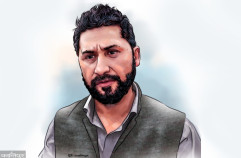Major Party Consensus on Transitional Justice Bill

We use Google Cloud Translation Services. Google requires we provide the following disclaimer relating to use of this service:
This service may contain translations powered by Google. Google disclaims all warranties related to the translations, expressed or implied, including any warranties of accuracy, reliability, and any implied warranties of merchantability, fitness for a particular purpose, and noninfringement.

Highlights
- The word 'child army' should not be written, the consent of the victim is mandatory in cases of human rights violations



The three major parties, Congress, UML and Maoist, also agreed on the remaining two issues of the Transitional Justice Bill on Friday. According to which, the word 'child army' will not be written in the revised bill, while the provision will be made to require the consent of the victim in cases of human rights violations.

The working group comprising of Congress's Ramesh Ukhtar, UML's Mahesh Bertaula and Maoist's Janardan Sharma had earlier resolved the dispute over the definition of serious human rights violations and how much punishment should be given to the culprits involved in it. "We have reached an agreement on the rest of the issue, now we have settled all the disputes of the bill," said Maoist leader Sharma, "we will formally reach the final point of agreement after discussing the language with the chairman, members and secretary of the committee." Bertaula, another member of the working group said. "If the victims of human rights violations do not freely agree to go to court, it will be decided on Monday whether to write it into the law," he said, "but there is no doubt about the victim's right to go to court." Bertaula says that it is necessary to write clearly in the amendment bill because if the right of the victim to go to court is not maintained in the law, it will theoretically weaken the law. ;
If the official announcement that all disputes are resolved is on Monday, the committee will submit the bill to the full house of Parliament for discussion within a day or two. The working group said that after some discussions, it will be approved and submitted to the National Assembly for discussion.
"The bill will now be passed in this session" Bertaula said, "There is no reason to delay because the disputes have been resolved theoretically." Outgoing militant organizations have responded that this issue of tripartite agreement is not valid for them. "We don't trust the law that is created by erasing the identity," said Lenin Bista, the outgoing president of the People's Liberation Army of Nepal. "If the parties do not accept our existence, we will be forced to knock on the international door for justice." Former child soldier Bishta and others filed a petition in the Supreme Court last May claiming that President Pushkamal Dahal and People's Government Chief Baburam Bhattarai have committed war crimes. It is scheduled to be heard in the Supreme Court on August 23. "The Supreme Court should order that the word child soldiers be mentioned in the Act by canceling the agreement and accepting our existence," Bista said The Bill has been stuck in the Parliament's Human Rights Committee for two years as the parties could not reach an agreement for a long time on how much to punish, whether or not to include the word child soldier in the law, and whether or not to reconcile in cases where the victim does not have free consent. To resolve it, the top leaders of the three parties decided to form a 'working group' consisting of one representative each. According to that, the regular meeting of the working group has reached consensus on the disputed issues.
Consensual brutal killings and premeditated killings are defined as 'serious violations of human rights'. The parties have agreed to amend the law so that the convicts of such murders cannot be given amnesty under any circumstances.
But human rights activists have opposed this, and the Human Rights Commission recently published a book and suggested that the parliament pass the law accordingly, saying that since all killings are a serious violation of human rights, the argument of criminalizing some and not others is not legal. ;
A group of human rights activists, the 'Accountability Monitoring Committee', protested on Thursday saying that it cannot be accepted because it is against the rule of law and the principle of international human rights to give a minimum sentence to the perpetrator. The parties have responded that they will proceed accordingly as all the disputed issues have been agreed upon. Maoist leader Sharma said, "It is not appropriate to prolong the transitional justice for eternity by just throwing out disputes and quarrels. We are determined to end it anyway."
 प्रकाशित : श्रावण १२, २०८१ ०५:०७
प्रकाशित : श्रावण १२, २०८१ ०५:०७

 २२.१२°C काठमाडौं
२२.१२°C काठमाडौं











